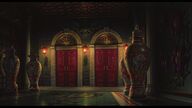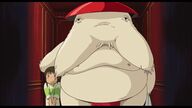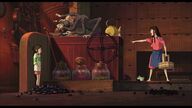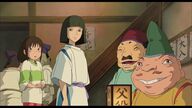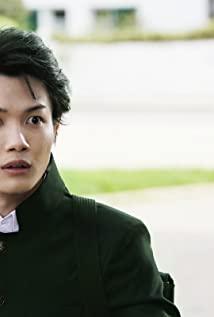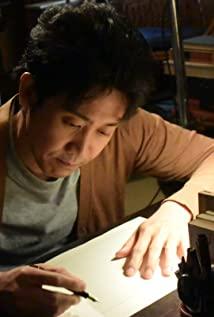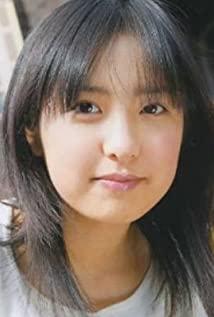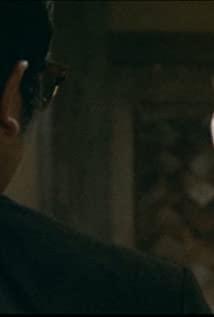It was two o'clock in the evening when I wrote this article. It has been about 15 years since I watched Spirited Away for the first time. From an ignorant elementary school student to half a person in society, the author's view of movies has also undergone tremendous changes. I hope that on the one hand, this article can put forward a different perspective in the many praises, praises and memories of childhood for the film, and on the other hand, it can clearly point out the regret of the movie "Spirited Away". From Chihiro's growth to Miyazaki's reflection on Japanese society, many of the thinking in this film are quite problematic.
1. "Pure" soup house
If we use a time and space as a tool to cut into the analysis of the film, then the analysis cannot avoid the living place of the protagonist. The soup house plays a key background throughout the film, laying a psychological and physical foundation for the purity of the story through intertextuality with the characters in the environment. Chihiro went from being a "clumsy" girl child laborer to a brave and responsible girl. She stumbled and dealt with big trouble for the "soup house", but used her courage, kindness, and recognition of the fetters of others to get her back. Dragon's name and parents. This is the main axis of the film's narrative. However, we should also note that the progression logic of the plot is based on the "purity" of the relationships established by the characters. It is not difficult for us to feel the contradictions implicit in the “Soup House”, a place of feasting. Granny Tang emerges as an "exploiter" who pursues fame and fortune, while the staff are alienated laborers who have lost their names and are captured by the signifier of desire. The status quo that almost everyone is seduced by money exposes the ugliness of the soup house; but, on the other hand, the ugliness of the soup house first finds its inner malaise in the protagonist's "helper" role. Grandpa Boiler, Xiao Ling, and Bai Long, who played a key role in the dramatic contradictions of the whole play, maintain the ugliness of the soup house in a recognizable species (specie), and further away from the complex intrigue in the real symbolic order Sex, this "evil" becomes the "evil" that can be named and accepted, and is actually a kind of "purity" . The plot of Grandpa Boiler does not seem to show that he has any unreasonable thoughts about his current job, nor can he find his rush for money; and Xiaoling herself is a "good person" and has simple sympathy for Chihiro, From the moment Chihiro was hired by Granny Yu, the 180° change in attitude seemed to be a success; and after Chihiro solved the problems of the rotten king and the faceless man one after another, those employees who seemed to always care about money were right She released her previous suspicions. Their suspicions about Chihiro seemed to disappear, and they didn't see any vengeful person who blamed the faceless man for entering the soup house to Chihiro's sloppy hands, and even forgot Chihiro's "stinky stench" as a human being. .
At the same time, we also noticed that in the early stage of the film, it is easy to give people the illusion of "duheism" (opportunism). When Chihiro's parents are alienated and she is in danger, all she encounters are "good people". Although all of this stemmed from Bai Long's guidance, it was more or less suspicious- from the bottom water boiler to the highest authority, it seemed that it was just a matter of a few elevators and a few extraditions. And the opportunity to get a job actually came from the hustle and bustle of Mother Tang taking care of the baby. However, the "Peach Blossom Spring" design method is a coincidence that since Chihiro came to this different world, the story has installed a content installation on the basis of the film installation, which makes the "daily life" in the story and the "different" in the story. think about the world". If it is said that "everyday life" corresponds to the protagonist's family's concern for the moving company, "Wonderland" is another set of rules of doing things. All vanished. Even if the gods and monsters maintain human etiquette norms (of course, the essence of human etiquette is the gift of God's etiquette), the audience has to consider those behaviors that go against common sense (exaggerated actions, language), accept that the world "exists unknown" ". So naturally, the simplicity and kindness of Grandpa Boiler and Xiaoling, and the attitude changes of other staff members are not a logical flaw in dealing with things, but are treated as a kind of character, and they act in such a simple way. So far, the film shows a contradictory type. The soup house is not a perfect peach blossom garden, but a place where human beings’ ugly desires are preserved, but this ugly place is pure, it stays in a romantic imagination. . Rather, it points to the limited left-wing ideals that the story is trying to convey.
The "failure" of growth
Hayao Miyazaki grew up in the shadow of the defeat in World War II, and has also experienced security struggles and "all-in-one struggle" one after another; the birth of Japan's "Lost Generation" and the Great Depression in the 1990s, these historical events have had a profound impact on the theme of his works. If such a conjecture is true: he hopes to use his works to find a new cultural spirit, so as to reinvigorate the young and middle-aged Japanese society as the backbone. Then "Spirited Away" is naturally inseparable from this implicit theme. Chihiro's father's lines seem to suggest this. However, in the face of complex spiritual and cultural issues, as a moderate anti-war and establishment faction, he seems to have to swing between two choices: teenagers should always grow up, refuse to grow up and hide in swaddling clothes is completely a This kind of escape and regression (regression), but the adult world is full of money and hopeless, facing the economic depression, the threat of nuclear weapons, and industrial pollution, human beings are losing ground.
It is conceivable that in order to balance this contradiction, Hayao Miyazaki may make calculations on the definition of "growth" of teenagers in his works: whether there is a dangerous situation full of challenges but not polluted by the adult world, so that the children in the works- - the surrogate for the identity and desire of the teenage audience - to be a responsible person in such a "purity". I'll point out later how dangerous this line of thinking can be, but for now let's focus on the work:
In the face of the purity of the characters, we should not stop at blaming this attribute on the personalities that haphazardly appear in many characters in a whimsical world. Rather, it should be considered that "purity" echoes the "essence" of that whimsical world, that is, the side of the story . This is undoubtedly revealed from the hidden foreshadowing of the story - the original bond between Bailong (Amber Lord) and Chihiro. Chihiro's solution to the problem of "togetherism" in the soup house conflict is not solved by supplementary plots in the follow-up. On the contrary, the author cleverly wrapped this "accidental" under the foreshadowing at the beginning of the story. This "contingency" is retrospectively rationalized into "inevitability" through Chihiro's recall of memory. Most importantly, the "fruit" of Qianxun's salvation was caused by the "cause" she was saved by Bai Long when she was a child. Without the long-established bond between Chihiro and Bailong, Bailong would not have become familiar with Chihiro and offered a helping hand when he met her for the first time. White Dragon is Chihiro's destined protector.
In other words, can I construct a formalism to elevate the relationship to the setting of the story? That is, Chihiro can safely return and grow in this challenging and whimsical world. This is the main theme of the story, that is, Hayao Miyazaki's special treatment of "growth". "Growing" can become "challenging" and "harmless", not only because it depicts a world far from the symbolic order of reality, but more importantly, this world relies on a guide, a protector and the hero's object of desire. He is not only an important role in moving the protagonist forward, but also the embodiment of the main theme of the story - the power contained in it itself is the power of unpolluted purity that the story intends to convey.
The purity here is presented through the relationship between Chihiro and Hakuryu, and Miyazaki deals with an emotional dullness: Can the relationship between Chihiro and Hakuryu be summed up in love? Although the two have very ambiguous actions in the eyes of the audience, whether it is the character performance or the lines, it is impossible to see Chihiro's "love" feelings for Bailong. Combined with the story's criticism of "human nature", it is not difficult to see that the story will deliberately avoid or even criticize the "view of love" that adults have tainted. Then the bond between Chihiro and Bailong here may be closer to what Adorno said about the most primitive form of attachment in the relationship between people. preconditions. And Honnet will further replace it with the concept of "recognition". The so-called "recognition" is not only the most direct and essential connection between people, it is not a cognitive relationship that arises from the subject's external knowledge of the object, but the subject resides in the object relationship and has an understanding of the object. A state of participation that is positively endorsed by the relationship. This state is "precognitive". There is an important difference between the "love" of this attachment and the "erotic desire" that treats the partner as a transient object.
"Spirited Away" seems to be hitting straight, stepping on Honnett's theory of acknowledgment and trying to outline a beautiful complex. Honnett defines "reification" as " forgetting of recognition" . And forgetting is precisely brought up as a critical element in Spirited Away's text. Whether it's Chihiro and Bailong forgetting their names, or Chihiro's parents forgetting that they were human, it shows a gesture of acknowledging that they have been forgotten. The animation uses animals, monsters, and miserable laborers (coal) to vividly restore the abstract process of "materialization"; whether it is Granny Qian's advice to Chihiro, or Chihiro's final confrontation Miraculously identified that the parents were not in the herd. They all seem to point to this inexplicable force, the original relationship between people. Through the memory of "recognition", the "performance" allowed Bailong to remove the dragon scales and return to his body; through the memory of "recognition", Qian Zhan found courage and decisiveness, and saved himself and his parents. By constructing a purely whimsical world, the most unrealistic aspects of Honnett's theory are also overcome by this fiction.
However, to achieve growth through the "fetters" of this recognition is precisely a "failure" of growth. Too much reliance on the purity of the whimsical world leads to a danger. The work seems to have successfully shaped Chihiro's adventure, but at the expense of real danger, Chihiro has not actually accepted a realistic "landing". Taking memories and fetters as the fulcrum, the story focuses on the past, the recollection of personal history and the complex of family return, which seems to restore the attitude of "taking history as a mirror". However, Chihiro did not face that layer of possible filth directly. The evil she faced was an overly pure and recognizable evil, an imaginary evil. This is achieved through three layers of perversion: first, the unique film installation of animation captures the audience, providing the audience with a dialectical illusion; the second is the distinction between the different world and the real world in the story, and by entering the different world, the daily life is changed. The law of life is "suspended", which strengthens the fiction in the fiction; the third is the operation of purity in the other world, "aestheticization" and "spectacle" of evil, and finally dealing with it helplessly. (The faceless man, the rotten god, the frog and the ukiyo-e image of the "money greedy") If the first layer of perverse separation itself creates the possibility for the audience to destroy the ideology of the text. The latter two are then the complete stitching of this possible overflow of scarcity
The consequence of this is that Chihiro's growth is "autistic growth", it can only spin in the vortex of objectification and "recognition", and can only find a position between those "different" images, And the lack of accepting the loss of the object of desire is the impossibility of desire. This makes Chihiro's transformation in the film more like a "baby-to-child" transformation rather than a "child-to-adult" transformation. The law of the adult world is drawn out, and the actions of the different world become a kind of "psychotic writing". , is an intertextual presentation of Alice in Wonderland. Hayao Miyazaki did not achieve the purpose of describing growth through her, but instead turned to a retrograde nostalgia complex .
3. Nostalgia
A "nostalgic utopia" that Bowman fears is born. Those rotten gods spit out the pollutants of industrial society, the fact that the rivers where the white dragons once lived were filled up by urbanization, and more importantly, the faceless man who was the embodiment of humanity's insatiable desires, all of which were short-lived. These things are either expressed in the form of the crisis faced in the story (repression); or they are a narrative satire. They are used to show the extent to which industrialization has harmed the natural environment, polluting the "god's" territory, and causing people to forget their original "recognition" with nature. This treatment itself can achieve a counter-ironic effect, that is, why do we show such a repulsive attitude in the face of these dirty things? What is the relationship between dirty and us? Here, the evil is a little crudely attributed to "materialization", "desire" and "industrial pollution". To a certain extent, a more realistic understanding strategy is that " materialization" and "desire" always have an unavoidable nature, and industrial pollution cannot be solved by giving it an aesthetic status in a whimsical world.
The film ignores this layer of thinking. The act of the faceless man throwing gold coins is the most parody time to expose the corruption of the "soup house". Those "evil" are exposed and passed on to the audience by this act, which is disturbing. However, in the end, the faceless man was tamed by Granny Qian and became an assistant and laborer. If the soup house is the extremity of Granny Tang's desire, then the hut is the " nostalgia complex " symbolized by Granny Qian, which is mythically endowed with the power to resist desire. Granny Qian is undoubtedly a "helper" character, and she is a reliable narrator of the story. She asks Chihiro to wait and emphasizes "don't forget", giving Chihiro key advice on recalling the white dragon.
So far, we found that the memory of "recognition" not only occurred in Chihiro's growth, but also deeply rooted in the nostalgia complex, the untouched childhood whims, natural environment, mother's love, and the pure bond between people became The sang of Paradise Lost. What is worrying is that this "nostalgia" does not have a rupture caused by the author's inner reflection, it connects the fetters between Chihiro and Bailong, Chihiro and his parents, and becomes the theme of the story. one slice". As far as the progression of the story goes, it seems too perfect. And this also causes it not to deal with the objects it rejects. A dialectics of desire will here predict the reactionary elements in the work: those industrial pollution, materialized reality, and war machines are just around the corner behind the story . When Miyazaki can't seem to find a way to reconcile growth and pollution, he assumes the worst and separates the bad as a whole. The "negative hallucination" of fascism instead dialectically admits that fascism is omnipresent, and behind the warm story is an alarmist about "everyone is in danger" in daily life. When faced with realistic pressures and life bottlenecks, it seems that reminiscing about childhood animations and finding that original emotion can briefly escape from reality. Because the story does criticize what he hates, it provides a richer opportunity for people to indulge in hallucinatory experiences such as "growth" and "love".
This is related to life considerations. Is the feeling of returning to "Spirited Away" today a satirical reenactment of the nostalgic elements of the film? However, it is a pity that there is no such a "harmless exploration place" in real life for us to grow up again. The rest is just sinking after contentment. Soberly aware of the limitations of the story and criticizing it, it's on hold here.
There is a lack of in-depth citations for inspiring others.
Zimo
6.21
(This article was first published on the author Zhihu)
View more about Spirited Away reviews



